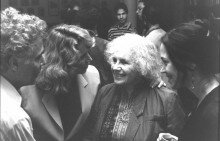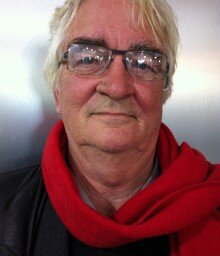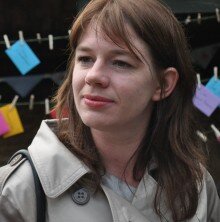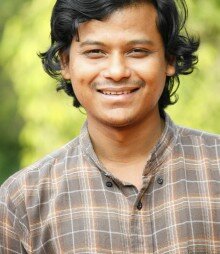The Time of Soul is the Time of Poetry
1. I hear a soul crying poignantly outside the door, wanting to come in
This title and all subsequent subtitles are taken from Meta Kušar’s latest collection of poems, Ljubljana (2004). This is a book that erases all demarcations between essay-writing, aphorisms and poetry, intuitively and discursively flowing from one genre to another; what is conceptual and experiential, what is essential and allegorical are merged, and yet we are unambiguously in the world of poetry. All that is seemingly in conflict and divergent, is precipitated into compressed images that ask to be reckoned with.
Aesthetics, ethics and culture are fused into one system that is not pyramidal, a system where relations, rather than being hierarchical, are extremely well coordinated. This inter-dependence, which discards the traditional paradigm of superiority and inferiority, is such that while expecting to find in her poetry ‘definitions’ of what culture is, we are instead offered glimpses of the everyday. After all, this is where life begins, moulded as it is with experience. Her words do not flaunt elitism. Snobbish culture is alien to her, though culture, provided it is ethically equipped, is, according to Kušar, precisely what invests life with substance.
It is difficult to take in belfries and insignia,
hearths, oracles, gold, the worked ore of home mountains.
Nor that of tall caves,
glowing invisibly !
What world is it that her poetry communicates? This world, we are warned, is not merely visible; it is in the power of the invisible to make us experience it. It is above all the experience of love, and the poet asks love to be so that children can partake in this joy and know their ancestors. The self-regenerating power of life is here, but never lacking a sense of the need for the eternal. And this constitutes the world of Kušar’s poetry, which is never guided merely by what is inside, but instead aims to harmonize what is within with what is outside the soul. She achieves this. In that sense her poetry always achieves its goal. Consonance between the inner and the outer is a force that gives Kušar a sense of being at home in the world, a world in which she can live safely and easily. How has she managed this? It may also have something to do with knowing that anger and wrath cannot regenerate creation.
Kušar’s Ljubljana is a world in which the poet feels at home, and each one of her lines is an expression of her undiluted passion for being in that particular world, but it is also a door out to the world at large. It is not surprising that she can so closely relate to the art of the painter France Kralj, whose town under the Castle offers not only artistic pleasure but also space in which art can find its form, even if the place itself is of no “world historical importance”. Each of Kušar’s poems opens a door onto the world, and she is not indifferent to anyone losing courage, and in every poem there is a part of each one of us. Kušar believes in connections of cosmic dimensions, because all is One. At times she finds Ljubljana hard to bear, but her Trnovo, where she can write poetry and long letters, still has a few dream-gardens left and these send forth sun-filled messages. And where the sun is, there is justice.
How many stars !
They plummet into the dream-garden under the Castle,
and in the mornings we gather them in buckets-full.
They turn to blueberries, kisses, hot-cross buns,
into the poetic dust which falls on suffering,
on future plans and on pianos.
And yet only some poems can breathe.
2. Happiness washes my heart
In spite of all the dislocated mental connections and the compression of words into lexical units, reading Kušar’s poetry nevertheless gives a strong sense of clear continuity, as though something powerful and invisible were coming through.
Again we could ask what this is.
Is it maybe Joy which Kušar is not afraid to either keep silent about or to say out loud? Joy is not evasive, it is possible to grab hold of it: look, here is a tree in the evening of happiness and God himself rolled with the mist which clung to the shore. The touch of her hands brought happiness into the life of him who has not been happy for a long time. She has said it out loud – she needs no recognition. Her lines are sometimes like a plea for the house to be a palm on which you can lean, snuggle up to, and safely cry your heart out – perhaps it is not even necessary to add that no one will betray you or mock you for it.
I tangle myself in memory,
in my senses, and I drift.
Laws exist,
but I do not know them.
I am watching the wind and the fog
through the branches.
Through petunias and lines of poetry.
On an old cup
something gathers,
and slips inside me.
Where Kušar writes, there is no sanctuary to inspire her, but above all the everyday. And yet she knows little of its burden, nor does she let herself be smothered by it. She chose solitude as a vantage point for observing truth, the truth not out there somewhere waiting to be discovered, but constantly being created. That is the invisible truth she will walk the length of, because chores remain undone on heavy chairs. The truth is present and yet invisibly so, so as not to be flaunted: The spirit of reality will have a distinct smell.
Kušar will not let truth be idolized by any kind of a ‘champion’. Personality can blow every valid and accepted truth to smithereens, and such] personality is beyond all known distinctions between male and female as superior and inferior. Truth is not something to kneel before; if anything, every truth, whatever its origin, needs to be brought under question.
3. Words are run together, but thoughts break in as they will
Meta Kušar’s communicates sparingly in words and in this she is ingenious – let her be spared from being copied by those who will read her.
Her world is profuse with light and at times this light is set ablaze. It is impossible to say why or how, but there is a definite sense that Kušar’s words warm us like the warmest blanket on an ice-cold night. We can only surmise: where nature’s still, spirit walks about.
This is not to say that she is a poet who subscribes to any kind of dualism. On the contrary, she categorically rejects it, ascertaining with defiance that life and being are in harmony, that they are one and undivided. The all too familiar dichotomy between spirit, or rather, soul and body, which culture and tradition have imposed on us, is alien to life as such. The tension arising when spirit and nature are to merge needs to be endured. Friedrich Nietzsche, according to Kušar, was unable to do this. If the bowl of consciousness cracks at this point there is no breakthrough; through the crack, ancient forms burst in, and when consciousness sees only misery and evil, this solves nothing. Which is not to say that seeing and recognizing evil is not a creditable quality : but elevating evil, following Nietzsche, is not a mark of soul’s greatness, or in the words of Meta Kušar – out of antiquity, dejection leaps.
Perhaps we are close to answering what Kušar’s poetry is, if the question of how much one can bear is answered with – only as much as one can take of infinity. In the here and now is Kušar’s answer ! Infinity does not start in the beyond. Each birth will last through into infinity – that is the seal of life; proof will be here, also in a thousand years time.
Pondering the question of man’s capacities to endure is in fact a plea for man to endure, and it is luck to be able, like clay, to bear the blows of history; you keep going in perseverance and perhaps you are even able to keep flood at bay. The worst possible case of history would be taking Prešeren’s Poems* out of our bloodied pockets. Kušar’s patriotism is conspicuous and charming, for it leaves no trace of xenophobia in its wake. Watching, cherishing and protecting our own does not necessarily mean being hateful or aggressive towards what is not ours. If we refused to accept something foreign as our ‘own’, to not have done so was, so to say, our privilege, our act of defiance, which has served to preserve us in the past. As early as 1983, Kušar foresaw that her country was coming of age and entering another era, leaving the old world behind in the 20th century.
Who doesn’t know that the day is preordained will not be present.
Who knows this will be part of it, even if not there.
On the right, the fatal love of south,
from the left, cascades of white and yellow sparks.
A scent emerging for centuries when June comes.
A gulp
cutting through everything from before.
Meta Kušar’s poetry has no pretensions to change the world – if anything, that is precisely what it does not aim to do. It simply asks how much one can bear, how much one can take in. A huge amount, she says, everything no temple is able to. All for the purpose of preserving the truth and standing by it.
Please, do not trample my rights!
A temple will not restore them to life!
To be human means to maintain one’s sense of justice. This seems to touch the core of Kušar’s poetics and ethical calling. Her words, mightier than the mightiest oak, keep confusion at bay. Perhaps she will even succeed in passing this on to future generations of Slovenians, to remind them to not forget the love of one’s country, faced as we are today with the much-announced internationalisation within the framework of Europe. Kušar can even be read as a prophet, who adamantly claims: only someone holding to words and direction, can – keep and preserve the right, so it will not tumble. What is written out affects us like the sky above us, words are turning to stones, shielding us on our path through life: tired, we lean against them for support.
Don’t collapse into habit, because to collapse means to imitate life.
4. Poetry is by no means dying. Orpheus is where he has always been.
Poetry is like a soul that has grown a body. Where the soul doesn’t grow its own body, letters too will fade on parchment. What is the path of soul’s embodiment?
Exodus of the soul starts with inner strength, but Kušar is not a mystic – poetry is her soul embodied and poets are good as long as they crack like fresh asparagus. Kušar’s independence of thought is enviable. She is like a model thinker from [the] late antiquity, who cherishes autonomy, solitude and independence. Solitude is a great advantage, perhaps even an explosive power, which gives charge to her words. Solitude has the same helpers as love, it is like evening, without seasons and a century. Her poetry knows its own origin and forms direct connections between man, his destiny and things that are our life. She is aware of the gift she’s been given, so she nurses it, or else it will disappear.
It is dangerous to give yourself over to pride, since pride is like a wager you will almost inevitably lose, but life is perseverance, and Kušar expects the same from poetry. She is not afraid to give short shrift to those who don’t know compassion, since they are messiahs of the stomachs. She is even learning a language one never speaks.
Language senses depth.
And the dark of a rose.
And a calm that doesn’t prize honours.
Her poetry at once asks questions and gives answers. It is never simply a forging of images. Seriousness, a handsome portion of it, is her advantage, and she is not to be reproached for this, even if we are looking for irony in her thoughts. Already in Madeira (1993), her first collection of poems, she asks the question: Am I here to utter images and push thoughts around?
A poem is not so much being in time, as it is pulsating. What gives meaning changes truth into something messianic, redemptive, and Kušar discovers the space for this primarily within herself. A line, shaped and formed by a particular thought, is shot through with cosmic dimensions, which carry clear Christian overtones, namely return as the eternal return, leading not to nothingness, but holding onto eternity and immortality.
Seasons pass through a body and black cloud –
As right into a hyacinth.
Anger goes through a flower and
sheds time. Verve. Verse. Everything!
How does a mimosa smell in the ether?
How far off does patience throw light?
Kušar’s spirituality is serious – male logic is never able to bear that. The power with which she crumbles the fate of history will undoubtedly be the perennial challenge of her poetry with which she clearly rejects the ancient understanding of truth as a truth immersed in the past - the anamnesis of truth. The unconditional basis through which she perceives life is not defined or understood solely through what has already been or was, that is in relation to the past, but also through what is yet to come. In other words, what goes on in life is not modelled only on the past, but also on the future. Thus there is always a hint of the possibility of a genuine difference in what is still to come. In this, Kušar’s Christianity, which does not eliminate pantheism, is at its strongest; after all truth is not about determinacy or shutting out – it is there to free and to redeem.
One day is more here than other.
5. Each thing wants to be that thing
With this line, Kušar expresses her commitment to realism, a realism she lives and which has the effect of a knife uncovering whatever may still be unread, let us say a crumbling wall guarding eternity. What would there be to see if there was no one to see? she asks in Madeira, adding: writing is a sacred business, the act of crumbling even more so.
Words are these, words,
and they burn.
Her universalism crumbles the false totality of enlightenment and calls for a healthy diversity, since with an honest opponent beside oneself – and let this be a differentiated individual – it is possible to develop and grow. These are the positive expectations the new spirit of difference, now stepping in the shoes of yesteryear’s spirit of identity, can give each one of us, so as to prevent us from nursing our pride, which happens all too often, or our sense of narcissistic superiority.
Trees will push up where
he trod. Acts are miraculous.
Flowers, have patience !
We have come from all the corners of the sky,
to talk loyally by the fire’s embers.
To dusk stories
even till dawn.
The expectations Kušar communicates to us in her poetry are accompanied with optimism, which, in an essay she wrote on Slavs and Europe**, she calls at least a small bridge of expectations. Our wishes and expectations should be driven by something positive and encouraging. But Kušar knows that everything coming our way, no matter how strongly desired, is always left to the stream of two contrary forces, which, in the manner of Herakleitos, she calls the stream of love and hatred. Kušar’s thoughts and opinions on humanity disclose fairly recognisable ethical views, since she takes individuation to be one of the most distinguishing traits of European man: individuation as the most solid foundation for everything, from keeping one’s word, and respecting the law to fulfilling the most complex ethical demands. Who would object to an ideal in which man had such a personality that the ethics in him functioned in a self-regulatory manner? The age-long dualism between spirit and nature would at once be resolved in a kind of “naturalised” ethics that would no longer play the role of one’s anti-nature, but simply be one’s other nature.
6. How do I go about tidying the cosmic warehouse of my country so as not to mess up its body of stars?
The natural life force of what Meta Kušar has so to say has such thrust that once you have grasped her main idea that for Slovenians landscape is stronger than ethnicity – a notion she borrows from Dr. Nace Šumi – you will not forget it easily.
Landscape has tremendous meaning !
It’s not only space. All the colours are there.
On small round mirrors they dangle from the morning song.
They guard roses through the night and they protect me.
Quails, strewn about me, conveyed the manor house.
In her second book of poems titled Silk and Flax (1997), Kušar talks about the encyclopaedia of the country she will one day write by watching the country’s soul. This way she indirectly posits the age-long question of the relation between nature and history. What gives life its centrality is the soul – not the spirit. It is in the nature of the soul to assert the deepest respect for life, its invigorating and surmounting force. It is the soul that says YES to life in its totality, and the spirit – which is angry – almost of necessity says NO in its self-sufficiency. No doubt, to swear by the soul is the same as to believe in life, whereas the spirit is like a skeleton, a heap of bones. It seems we have become scared, if not horrified, that one day, in the manner of an archaeologist someone would – disrespectfully – rummage through our skeletal remains, and therefore we have opted for cremation as our path to eternity.
Life has always been most closely bound to nature and its phenomena, and anyone living in close communion with nature, treating it with respect and responsibility, is likely to have developed a deeper moral sense. A feeling for fairness, a need for justice – these two immense sources of Slovenia’s traditional resistance – do not, after all, emerge from any religious or ideological demand, but from one’s attitude towards the natural environment and the ever-turning, regenerating cycle of life.
In the past, Slovenians lived at one with nature and her earthly powers. Those whose lives are closely bound to nature are different to those who live separated from it. To explain, the ethics of consumer-market mentality is different to an ethics guided by the natural life cycle. All great cultures and civilizations developed their codes of morality at the time of their closest connection with nature. We may wish to consider what the future of the Slovenian nation will be if, in the name of the European economic order, we are to sever what throughout the centuries has been the source of our most archetypal inner strength. This strength is connected with the all of nature’s complexities, and each and every person has got the key to understanding all the world’s phenomena. Contact with nature can even generate a theoretical instinct – ancient Greeks demonstrated this beautifully – and it is out of this instinct that science and art emerge.
What then are we to do with this world of ours, if we are to follow, at least in part, Kušar’s encyclopaedia of a country, which is already in the process of its realization?
How terrible to lose our share
of being human.
Instinctively we know how important it is to cultivate our contact with nature as something primeval, if for no other reason than to try and preserve it in the face of technical progress and thus ensure that life has a chance to continue. The life-cycle essentially means a matching of man’s inner and outer worlds, the outer being both natural and social, and further their correspondence to a universal order – to one great whole. And life is this complete naturalised cycle which encompasses culture as nature’s opposite pole. Nature and culture have always been our best teachers, but together, as an undivided organic whole, giving life its central meaning, making it not only fuller but also making it possible for us to fulfil ourselves in everyday existence. If this is our approach to and our sense of life then we can say that we are truly at home in the world. And that is how we wish to be at home also within Europe – and it should not be too much to ask.
7. To be one with life, even if you don’t live !
Life comes first, not logic, though it is pleasant/it eases things – and life generates logic. Life does not arise from love, but love – the first law of creation – arises from life. That is and remains one of the key messages of Kušar’s poetry, her experience of Ljubljana, her world of being.
All Kušar has created is in a sense there to convince us that once love has broken free and become independent, it has lost its creative power and become barren, but not many can understand that her poetic encyclopaedia will not go on repeating this for ever. And yet, with her clear economy of language, she has been able to utter the mystery of life and she is bound to carry on building from the same bricks. Hope, according to Meta Kušar, can never exhaust itself and her poetic gaze is able to accommodate a lot of light. Happiness makes eyes insatiable, and Kušar’s poetic gaze radiates a calm that makes us wonder where her words get so much enviable dignity and purity from, appealing to us to say ‘no’ to the terrible habit of perversity worship.
Word-thieves want people to pick at ink.
Without a doubt there is still an unwritten encyclopaedia of life ahead of her, in which nature and history will find themselves eased even more into a certain realism and universalism. Then anyone who loves life will say that they can see a synthesis of the natural (romantic) and the historical. The path of Abraham (the Promised Land) and Odysseus (Path of the eternal return home) will converge. In any case, Kušar has never separated them.
Will her poetry convey her insight into the meaning of existence, for which ethics is the central pivot around which life with all its attendant phenomena turns? A poet’s understanding of the world is primarily chaotic and experiential; it is fully submerged in his or her ego. Ethics, of course, is a breaking out of what is merely experiential, since it already suggests cognition and knowledge, anticipation even, of the pathway to be formed between I and you and from there with the whole world – with One. The author of Ljubljana is – in everything – on the border of the experiential, crossing over into an ethically conscious perception of the world. Aesthetics and ethics play an equal part in the poetry of Meta Kušar, who will never reject either one or the other.
At the end of [her] ‘Ljubljana‘ she speaks of the passage between the wall and air; a border that her poetry erases, because no pressure can bend it. Her soul finds embodiment in her poetry, and one of her most confident as well as her most attractive thoughts is that the time of poetry is the time of soul. Or we might add: life placed within an eternal time frame, and that is, so to say, talking about immortality.
Can I draw the line?
Will I hold out when the consequences coincide with duties,
or will I fall on thorns?
O, to breathe sweet, gentle balm.
And know that nothing is ever lost.
How does one express a poet’s understanding of the world, which is compressed into the mode of allegory and symbols, with logos? Nothing one can say can reach the level of what is condensed in poetic language, and yet reading poetry and entering the poetic world of Meta Kušar, a world which is constantly pulsating, one is easily convinced that with art we seize the world. This and no other conclusion serves to justify the writing of this essay.
Notes:
*France Prešeren (1800 – 1849) is Slovenia’s greatest romantic poet and a national icon. The reference to Prešeren’s Poems being taken out of bloodied pockets [historically] corresponds to the events of World War II, in which it was common for Slovenian fighters to carry Prešeren’s Poems in their breast pockets as a sign of national consciousness.
**Sodobnost, 2004, no. 6.
First published in Sodobnost; letnik 68, no. 9-10, september-october, 2004.
Translated by by Ana Jelnikar & Stephen Watts












